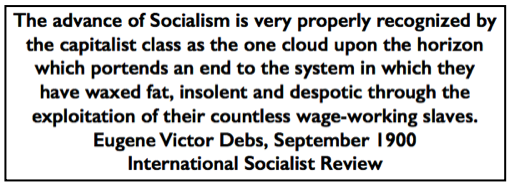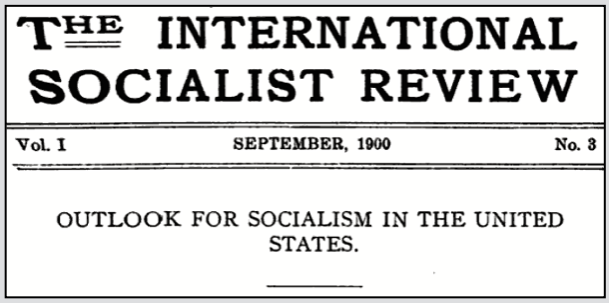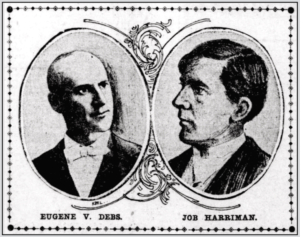 ———-
———-
Hellraisers Journal – Monday September 3, 1900
“Outlook for Socialism in the United States” by Eugene V. Debs
From the International Socialist Review of September 1900:
[Part I of II-by Eugene Debs, Social Democratic Party’s Candidate for President.]
The sun of the passing century is setting upon scenes of extraordinary activity in almost every part of our capitalistic old planet. Wars and rumors of wars are of universal prevalence. In the Philippines our soldiers are civilizing and Christianizing the natives in the latest and most approved styles of the art, and at prices ($13 per month) which command the blessing to the prayerful consideration of the lowly and oppressed everywhere.
In South Africa the British legions are overwhelming the Boers with volleys of benedictions inspired by the same beautiful philanthropy in the name of the meek and lowly Nazarene; while in China the heathen hordes, fanned into frenzy by the sordid spirit of modern commercial conquest, are presenting to the world a carnival of crime almost equaling the “refined” exhibitions of the world’s “civilized” nations.
And through all the flame and furore of the fray can be heard the savage snarlings of the Christian “dogs of war” as they fiercely glare about them, and with jealous fury threaten to fly at one another’s throats to settle the question of supremacy and the spoil and plunder of conquest.
The picture, lurid as a chamber of horrors, becomes complete in its gruesome ghastliness when robed ministers of Christ solemnly declare that it is all for the glory of God and the advancement of Christian civilization.
This, then, is the closing scene of the century as the curtain slowly descends upon the blood-stained stage—the central figure, the pious Wilhelm, Germany’s sceptered savage, issuing his imperial “spare none” decree in the snag froid of an Apache chief—a fitting climax to the rapacious regime of the capitalist system.
Cheerless indeed would be the contemplation of such sanguinary scenes were the light of Socialism not breaking upon mankind. The skies of the East are even now aglow with the dawn; its coming is heralded by the dispelling of shadows, of darkness and gloom. From the first tremulous scintillation that guilds the horizon to the sublime march to meridian splendor the light increases till in mighty flood it pours upon the world.
From out of the midnight of superstition, ignorance and slavery the disenthralling, emancipating sun is rising. I am not gifted with prophetic vision, and yet I see the shadows vanishing. I behold near and far prostrate men lifting their bowed forms from the dust. I see thrones in the grasp of decay; despots relaxing their hold upon scepters, and shackles falling, not only from the limbs, but from the souls of men.
It is therefore with pleasure that I respond to the invitation of the editor of the International Socialist Review to present my views upon the “Outlook for Socialism in the United States.” Socialists generally will agree that the past year has been marked with a propaganda of unprecedented activity and that the sentiment of the American people in respect to Socialism has undergone a most remarkable change. It should be difficult to imagine a more ignorant, bitter and unreasoning prejudice than that of the American people against Socialism during the early years of its introduction by the propagandists from the other side. I never think of these despised and persecuted “foreign invaders” without a feeling of profound obligation, akin to reverence, for their noble work in laying the foundations deep and strong, under the most trying conditions, of the American movement. The ignorant mass, wholly incapable of grasping their splendid teachings or appreciating their lofty motives, reviled against them.
The press inoculated the public sentiment with intolerance and malice which not infrequently found expression through the policeman’s club when a few of the pioneers gathered to engraft the class-conscious doctrine upon their inhospitable “free-born” American fellow citizens. Socialism was cunningly associated with “anarchy and bloodshed” and denounced as a “foul foreign importation” to pollute the fair, free soil of America, and every outrage to which the early agitators were subjected won the plaudits of the people. But they persevered in their task; they could not be silenced or suppressed. Slowly they increased in number and gradually the movement began to take root and spread over the country. The industrial conditions consequent upon the development of capitalist production were now making themselves felt and Socialism became a fixed and increasing factor in the economic and political affairs of the nation.
The same difficulties which other countries had experienced in the process of party organization have attended the development of the movement here, but these differences, which relate mainly to tactics and methods of propaganda, are bound to disappear as the friction of the jarring factions smoothens out the rough edges and adjusts them to a concrete body—a powerful section in the great international army of militant Socialism.
In the general elections of 1898 upwards of 91,000 votes were cast for the Socialist candidate of the United States, an increase in this “off year” of almost two hundred per cent over the general elections of two years previous, the presidential year of 1896. Since the congressional elections of 1898, and more particularly since the municipal and state elections following, which resulted in such signal victories in Massachusetts, two members of the legislature and a mayor, the first in America, being elected by decided majorities—since then Socialism has made rapid strides in all directions and the old politicians no longer reckon it as a negative quantity in making their forecasts and calculating their pluralities and majorities.
The subject has passed entirely beyond the domain of sneer and ridicule and now commands serious treatment. Of course, Socialism is violently denounced by the capitalist press and by all the brood of subsidized contributors to magazine literature, but this only confirms the view that the advance of Socialism is very properly recognized by the capitalist class as the one cloud upon the horizon which portends an end to the system in which they have waxed fat, insolent and despotic through the exploitation of their countless wage-working slaves.
In school and college and church, in clubs and public halls everywhere, Socialism is the central theme of discussion, and its advocates, inspired by its noble principles, are to be found here, there and in all places ready to give or accept challenge to battle. In the cities the corner meetings are popular and effective. But rarely is such a gathering now molested by the “authorities,” and then only where they have just been inaugurated. They are too numerously attended by serious, intelligent and self-reliant men and women to invite interference.
Agitation is followed by organization, and the increase of branches, sections and clubs goes forward with extraordinary activity in every part of the land.
In New England the agitation has resulted in quite a general organization among the states, with Massachusetts in the lead; and the indications are that, with the vigorous prosecution of the campaign already inaugurated, a tremendous increase in the vote will be polled in the approaching national elections. New York and Pennsylvania will show surprising socialist returns, while Ohio, Michigan, Indiana, Illinois, Missouri and Kentucky will all round up with a large vote. Wisconsin has already a great vote to her credit and will increase it largely this year. In the west and northwest, Kansas, Iowa and Minnesota will forge to the front, and so also will Nebraska, the Dakotas, Montana, Oregon, Washington, Idaho and Colorado. California is expected to show an immense increase, and the returns from there will not disappoint the most sanguine. In the southwest, Texas is making a stirring campaign, and several papers, heretofore Populist, will support our candidates and swell the socialist vote, which will be an eye-opener when announced.
On the whole, the situation could scarcely be more favorable and the final returns will more than justify our sanguine expectations.
It must not be overlooked, however, when calculations are made, that this is a presidential year and that the general results will not be so favorable as if the elections were in an “off year.” Both the Republican and Democratic parties will, as usual, strain every nerve to whip the “voting kings” into line and every conceivable influence will be exerted to that end. These vast machines operate with marvelous precision and the wheels are already in motion. Corruption funds, national, state and municipal, will flow out like lava tides; promises will be as plentiful as autumn leaves; from ten thousand platforms the Columbian orator will agitate the atmosphere, while brass bands, torchlight processions, glittering uniforms and free whisky, dispensed by the “ward-heeler,” will lend their combined influence to steer the “patriots” to the capitalist chute that empties into the ballot box.
The campaign this year will be unusually spectacular. The Republican party “points with pride” to the “prosperity” and the “war record” of the administration. The Democratic party declares that “imperialism” is the “paramount” issue, and that the country is certain to go to the “demnition bow-wows” if Democratic officeholders are not elected instead of the Republicans. The Democratic slogan is “The Republican vs. the Empire,” accompanied in a very minor key by 16 to 1 and “direct legislation where practical.”
Both these capitalist parties are fiercely opposed to trusts, though what they propose to do with them is not of sufficient importance to require even a hint in their platforms.
Needless is it for me to say to the thinking workingman that he has no choice between these two capitalist parties, that they are both pledged to the same system and that whether the one or the other succeeds, he will still remain the wage-working slave he is today.
What but meaningless phrases are “imperialism,” “expansion,’ “free silver,” “gold standard,” etc., to the wage-worker? The large capitalists represented by Mr. McKinley and the small capitalists represented by Mr. Bryan are interested in these “issues,” but they do not concern the working class.
[Photograph and emphasis added.]
~~~~~~~~~~~~~~~~~~~~~~
SOURCE
The International Socialist Review, Volume 1
(Chicago, Illinois)
July 1900-June 1901
Charles H. Kerr & Company, 1901
https://books.google.com/books?id=KJ_VAAAAMAAJ
Sept 1900
“Outlook for Socialism in the United States”
-by EVD
https://play.google.com/books/reader?id=KJ_VAAAAMAAJ&printsec=frontcover&pg=GBS.PA129
https://www.marxists.org/history/usa/pubs/isr/v01n03-sep-1900-ISR-gog-Wisc.pdf
IMAGE
SDP Campaign, EVD n Job Harriman, SF Call p2, Mar 9, 1900
https://chroniclingamerica.loc.gov/lccn/sn85066387/1900-03-09/ed-1/seq-2/
See also:
See article followed by notes:
“Outlook for Socialism in the United States” by Eugene V. Debs
https://www.marxists.org/archive/debs/works/1900/000900-debs-outlookforsocialismintheus.pdf
Debs
His Life, Writings and Speeches
-with Biography by Stephen Marion Reynolds
Appeal to Reason, 1908
Note: this is 3rd edition, 1910
-with intro by Mary Marcy
(search: outlook socialism passing century)
https://books.google.com/books?id=1X3rXrzI5GgC
https://archive.org/stream/cu31924002385379#page/n7
The International Socialist Review
https://www.marxists.org/history/usa/pubs/isr/
~~~~~~~~~~~~~~~~~~~~~~~~~~~~~~~~~~~~~~~~~~~~~
Worker’s Song – Dropkick Murphys


